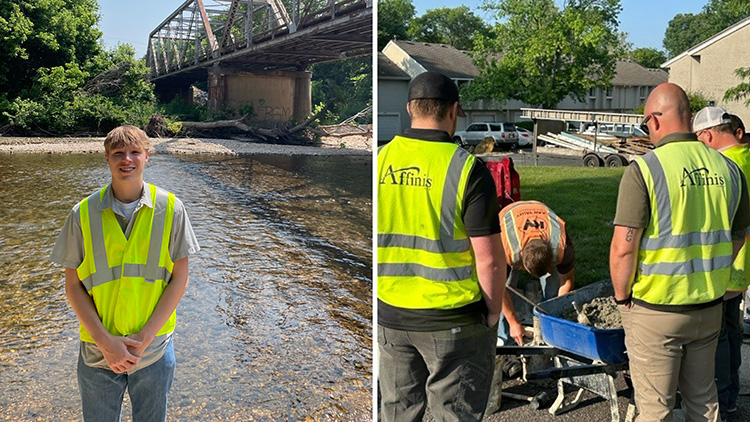What It’s Like to Intern at Affinis
Posted on Tuesday, August 22nd, 2023 by Affinis CorpIn Firm News, tagged in

This summer, we brought on two interns, Will Atkinson and Dane Walker. Will is a student at the State Technical College of Missouri, studying civil engineering technologies. He has been supporting our construction engineering team. Dane is a student at the University of Missouri-Columbia. He is pursuing a degree in civil engineering and has been learning from our structural group.
We asked each of them to share their insight on interning at Affinis. Below, you’ll find details on their roles and responsibilities and their advice to other interns.
Tell me about the work you are doing as an intern at Affinis.
Will: I have been working as inspection intern, taking concrete tickets, taking pictures of work being performed, interpreting plans, writing a daily report based on the work performed that day, and helping to inspect the work being performed.
Dane: As an intern at Affinis, a lot of the work I do is supplemental. This includes reviewing shop drawings that are sent to us by contractors and computing design values for different projects. I also create various worksheets for future projects from corresponding standards and manuals. These worksheets help expedite the design process, as I am checking specific types of structures that may eventually be required. Occasionally, I will also get outside of the office for some field visits and facility tours.
What does your day look like?
Will: I get to the job site at 7:00 AM and am trained on how to interact with the contractor and residents, learn how to fill out the daily diary, and shown what goes on with general job site inspection.
Dane: I usually arrive at the office around 7:30 AM. When I first get to my cubicle, I check my email and calendar for any new tasks that I’ve been assigned. I also check Microsoft Teams for any messages that may have important information. If we are collaborating with contractors on a large project that is in progress, I will also check their respective subcontractor portal for any new submittals that need review. When there are no new assignments with higher priority, I usually pick up working on whatever I left off with the day before. Then, I will usually take my lunch break around noon for about 30 minutes before returning to work. I continue with my work for the day until about 4:00 PM when I leave.
Is it similar or different than you imagined? Why?
Will: It’s pretty similar to what I expected, because my inspection class taught me the basics of inspection principles.
Dane: I imagined I would be running calculations to obtain design values. These values are computed using worksheets in MathCAD, a program that I was unfamiliar with, but was pretty straightforward to learn. One big difference is that I expected to create structure profiles using design software, but Affinis retains technicians and designers that are assigned these tasks instead. The other major difference has more to do with the work culture. I was expecting I would have to run everything through my supervisor and that my workload would be very structured, but Affinis has done a nice job trying not to overwhelm me with tasks, while also encouraging me to take responsibility for my own assignments.
How does it compare to your schoolwork?
Will: I had an inspection class last semester, so I felt prepared for the internship.
Dane: Work assignments are a lot more involved and more time-consuming than schoolwork. Oftentimes, schoolwork gets piled on to keep students busy, but individual assignments don’t take a long time to complete or require much focus. Necessary resources are also usually provided for school assignments whereas, in the workplace, you often have to find it yourself. Schoolwork generally only pertains to one specific field of engineering, but work assignments usually deal with a variety of different fields. It’s a bit of a learning curve in the workplace, since school assignments are more rudimentary and rarely formatted as “real world” examples. Overall, work assignments have proved to be more mentally rewarding, since the application of engineering principles can be associated with a real, tangible project.
What are you learning from your position?
Will: I’m learning general inspection practices, how to interact with contractors and residents, material testing principles, and how to interpret plans and write daily reports.
Dane: I’m learning a lot about the different types of structures. I’ve become more familiar with the makeup of bridges and how their elements distribute loads throughout the structure down to the ground. I’ve also been introduced to more below-ground structures that are often designed to handle water flow. I’m learning more about the placement of steel bars, as well the various techniques used to reinforce different structures.
What have you enjoyed most?
Will: I have most enjoyed talking with the contractors and seeing what they think of the project.
Dane: I’ve enjoyed the MathCAD work the most so far. I like running calculations and checking design values to ensure they meet certain requirements. Working with numbers and formulating equations helps me enter a flow state during work. It also helps me relate the material that I’ve learned from school with the real world, which has improved my understanding of how and when to apply different engineering principles.
What advice would you give to another intern?
Will: My advice to another inspection intern would be to get out and talk to everyone on the job-site, because it makes the job a lot more enjoyable for everyone.
Dane: Learn to be resourceful. Not everything that you need for an assignment will be given to you. A lot of the time, the resources you need won’t even all be in the same place. One assignment could require several resources that may be scattered across several locations.
Thank you to Will and Dane! We look forward to seeing what you do next.